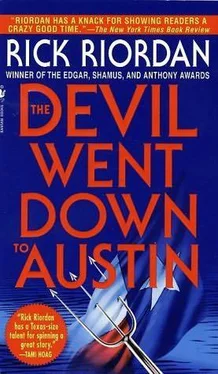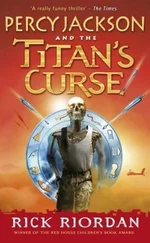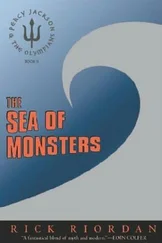Rick Riordan - The Devil went down to Austin
Здесь есть возможность читать онлайн «Rick Riordan - The Devil went down to Austin» весь текст электронной книги совершенно бесплатно (целиком полную версию без сокращений). В некоторых случаях можно слушать аудио, скачать через торрент в формате fb2 и присутствует краткое содержание. Жанр: Криминальный детектив, на английском языке. Описание произведения, (предисловие) а так же отзывы посетителей доступны на портале библиотеки ЛибКат.
- Название:The Devil went down to Austin
- Автор:
- Жанр:
- Год:неизвестен
- ISBN:нет данных
- Рейтинг книги:4 / 5. Голосов: 1
-
Избранное:Добавить в избранное
- Отзывы:
-
Ваша оценка:
- 80
- 1
- 2
- 3
- 4
- 5
The Devil went down to Austin: краткое содержание, описание и аннотация
Предлагаем к чтению аннотацию, описание, краткое содержание или предисловие (зависит от того, что написал сам автор книги «The Devil went down to Austin»). Если вы не нашли необходимую информацию о книге — напишите в комментариях, мы постараемся отыскать её.
The Devil went down to Austin — читать онлайн бесплатно полную книгу (весь текст) целиком
Ниже представлен текст книги, разбитый по страницам. Система сохранения места последней прочитанной страницы, позволяет с удобством читать онлайн бесплатно книгу «The Devil went down to Austin», без необходимости каждый раз заново искать на чём Вы остановились. Поставьте закладку, и сможете в любой момент перейти на страницу, на которой закончили чтение.
Интервал:
Закладка:
They would go in hard and fast. They would be quick to shoot and they'd cry no tears if there was any resistance.
"I'll go to the marina with you," I told Lopez. "But you forgot one thing."
The cords of his neck muscles stood out like bridge cables. "Yeah?"
"Clara Doebler supposedly killed herself," I said. "Unless you saw something that night you didn't put in the report."
Something in Lopez's demeanour changed, like a tide reversing, drawing back in.
"Heard," Lopez murmured. "I heard something. And yes, Navarre, I reported it. Every day for five years, I've tried to convince myself that my superiors were right-that I was imagining things. I went along with what the brass told me. I went along with my shrink, telling me it was just frayed nerves. But when I walked up to Clara Doebler that night, while she was writing her suicide note, I could hear her talking-whimpering, almost.
There was nobody with her. If there had been, for me not to see them, they would've had to have been in the trees-ten, fifteen feet away, standing in total darkness. But just for a second, as I was coming up, I could swear I heard a second voice. A man's voice. Real gentle."
The tide was still pulling in Lopez's direction, washing out the patio stones under my feet.
"What did the voice say?" I managed.
Lopez shifted, pulled the sunglasses off his shirt collar.
"It wasn't a conversation, Navarre. More like the voice was instructing Clara Doebler, telling her what to write."
Date: Thurs 15 Jun 2000 03:17:54 0500 From: RubyToo@ixnet. net ReplyTo: none XMailer: Mozilla 4.7 (Macintosh? I? PPC) XAcceptLanguage: en To: VLopez@travis. co. tx. state Subject: search patterns
What was the hardest part, Detective?
Talking to the family? Those pinched faces. The old grandmother crying, cupping her hands over a grimace. They are chattering at you in Chinese, and the ones who can translate, the adolescents, are telling you with embarrassment that the family believes in evil spirits, that something down there took a liking to their child.
The victim's family always wants so much from you. You arrive on the scene and they have knives and forks ready to dig in-taking whatever they can from you. They want reassurance. They want answers. They want you to bring their little boy back to life.
And so you dive, day after day-such a small area on the surface, one little cove in one public park. You could throw a football across it and hit the opposite bank. But you dive the entire area and find nothing. You comfort yourself with formulas, buoyancy charts, DPS manuals that tell you where the body should be, what it should look like, how the currents might have moved it. But you find nothing.
Every evening you come up from your third, maybe fourth dive that day, and the family is still there, holding vigil on the shore, looking for any sign-anything in your face, any gesture.
You have to be a wall, completely impassive. You wish somebody would tell the family,
"You don't want to be here. You don't want to see the thing when we finally find it." You wish you could tell them that the real find will be quiet. When it happens, the diver will say nothing. He will quietly direct the boat around, place it between the spectators and the surface site. They will bag the body underwater. They will do everything they can to keep it hidden.
You can't tell the family that. The only thing they want to hear is the one thing you can't tell them-that their kid is okay.
But that's not the hardest part, is it? The job isn't so bad. It's a community project.
You're never alone, never more than a few inches from the neon gloves of the next diver on the line. You can think of the lake in grids, tidily partitioned by weights and yellow strings, flags and GPS coordinates. It's impersonal. Scientific. And when the time comes to call it quits, to face the facts that enough taxpayer money has gone toward finding one little Chinese boy, that eventually he'll surface anyway-the decision isn't yours. You don't have to tell the family. You just roll up your line, fold the unused body bag.
Afterward, you sit on the rocks at sunset, thinking about the boy, what he must have felt like that Saturday-a sunny picnic, the cool water such a welcome relief after lunch, no one worried about that extra hot dog he ate. Maybe he heard his mom calling to him-"Be careful." And he looked down the shore, way out past the bend where the rich yachters were eating lunch on the decks of the restaurant, and he thought how fun it would be to go there. It didn't look far.
That moment comes when you realize what the kid was doing, what he felt like when he ate water, then found he couldn't surface.
And for all your mapping, your talks with the parents, your days of searching-it all comes down to one horrible realization. You're alone, and you decide to do one more dive.
You find him there, the glint of his gold necklace in your flash light. The rest of him is fuzzy, white, unhuman-a child turning into a cloud.
And rationally, you realize what happened. He dove under the deck, thinking of the novelty of swimming beneath a building. He didn't realize the old spools of wire were down there, bricks, fishnets, hooks, crayfish traps. And then he became tangled, and realized that the sounds above him were the last he would ever hear- people walking, the voices of diners, the clink of dropped plates, all amplified through the aluminium pontoon floats and the water. He drowned in the dark, and stayed there for days while above him, rich folk toasted the sunset with Chardonnay. Yacht purchases were discussed. Engagement rings were unveiled over crabcakes and microbrewery beer.
Businesses were planned, incorporation papers signed. And nosy spectators watched the divers at the public access beach down the shoreline, wondering what the fuss was about, complaining how it affected their speed boating.
Rationally, you understand how it happened. You understand that this is just one more bad memory to associate with a place- another policeman's marker.
The worst part is, you can't help thinking that the old Chinese grandmother was right-some spirit, some dark thing in the water, took a liking to that boy. And it bothers you that you were the one who knew where to look.
CHAPTER 37
"I don't know any Clyde," the boat jockey insisted.
He couldn't have been over nineteen, but he appeared to be the man in charge. He was frantically filling out paperwork while two even younger jockeys worked the docks-using the forklift to lower a Fountain 32 Lightning into the water.
Several affluentlooking couples stood behind us, waiting their turn.
"Clyde Simms," Lopez said. "You know-big ugly white guy. Runs the place."
The boat jockey shook his head. There were two twentydollar bills folded in his fingers, a tip from the previous customer.
"Yes, sir," he said. "If the manager's name is Clyde, I'll take your word for it. I don't know him. He isn't around."
"That the office?" I asked.
I pointed to a set of stairs on the side of the warehouse, leading up to a secondstory door. Parked below the stairs were two Harley Davidson VTwin hogs-both FLSTF models, black and chrome. Leather cones jutted up behind each seat-perfect for holding either longstem bouquets or shotguns. I was betting that the owners, wherever they were, were not florists at heart.
The boat jockey said, "I'm sorry, you can't-"
Another customer shouldered his way to the counter and put his elbow between the boat jockey and me. He brandished a claim ticket.
"My boat," he said. "It's three o'clock and my boat isn't in the water."
"No, by all means," I said. "You go right ahead."
The newcomer gave Lopez and me the briefest sideways glance, just long enough to determine we weren't members of his country club, then turned his attention back to the boat jockey. "Well?"
Читать дальшеИнтервал:
Закладка:
Похожие книги на «The Devil went down to Austin»
Представляем Вашему вниманию похожие книги на «The Devil went down to Austin» списком для выбора. Мы отобрали схожую по названию и смыслу литературу в надежде предоставить читателям больше вариантов отыскать новые, интересные, ещё непрочитанные произведения.
Обсуждение, отзывы о книге «The Devil went down to Austin» и просто собственные мнения читателей. Оставьте ваши комментарии, напишите, что Вы думаете о произведении, его смысле или главных героях. Укажите что конкретно понравилось, а что нет, и почему Вы так считаете.










